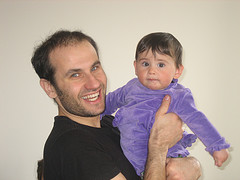The Story of Lenny (and All of Us)
May 22nd, 2007 by Larry Smith I have worked my friend Lenny into many of my own stories for as long as I have been writing professionally. Guys like Lenny are what writers live for, both for the reported adventures and for the ideas you bounce off him in a schvitz. We’ve known each other for 20 years; I’ve watched him go from cheese-fry-eating deadhead stoner engineering major to no-percent-body-fat rock climbing, rocket science dad. He’s one of the funniest people on the planet, and a natural storyteller (my wife thinks his riffs on life could single-handedly catapult podcasts into America’s consciousness). There are days when Lenny comes across as the luckiest, happiest man alive (”Dude, I
I have worked my friend Lenny into many of my own stories for as long as I have been writing professionally. Guys like Lenny are what writers live for, both for the reported adventures and for the ideas you bounce off him in a schvitz. We’ve known each other for 20 years; I’ve watched him go from cheese-fry-eating deadhead stoner engineering major to no-percent-body-fat rock climbing, rocket science dad. He’s one of the funniest people on the planet, and a natural storyteller (my wife thinks his riffs on life could single-handedly catapult podcasts into America’s consciousness). There are days when Lenny comes across as the luckiest, happiest man alive (”Dude, I  just got back from climbing in Yosemite, my wife turned a box of vegetables into food, and my kid basically looked happy to see me”); there are times when he’s one morose motherfucker (”Yeah, I figured I’m never going to have as much fun as I used to, so I just stopped trying.”).
just got back from climbing in Yosemite, my wife turned a box of vegetables into food, and my kid basically looked happy to see me”); there are times when he’s one morose motherfucker (”Yeah, I figured I’m never going to have as much fun as I used to, so I just stopped trying.”).
The way Lenny tells his life story sets the tone for both how the world views him and how he views himself. (His six-word memoir: “Climbing, porn, crack, science. Still bored.”) Most of Lenny’s friends think he’s so totally The Man (cool wife, cute kid, great job, phat house in San Francisco, etc.). And that’s exactly the narrative we want him to follow. When he doesn’t, and gets down on himself (albeit in his own Woody Allen-esque way) we get kind of annoyed. Yet we also feed on it, because it’s part of what makes Lenny Lenny.
This Is Your Life (and How You Tell It) is a fascinating article in The New York Times about the role of storytelling is our lives, and its ability to shape our personalities. I suspect most of us have a gut feeling that we are the sum of our stories, but new research backs this up. Writes Benedict Carey:
Depending on the person, the story itself might be nuanced or simplistic, powerfully dramatic or cloyingly pious. But the point is that the narrative themes are, as much as any other trait, driving factors in people’s behavior, the researchers say. … By better understanding how life stories are built, this work suggests, people may be able to alter their own narrative, in small ways and perhaps large ones.
This notion that the stories we tell about ourselves affect our behavior, mood, and whole being at once makes perfect sense and also seems a bit like a passage from The Secret. Are you you, or are you the you you offer up to other people? And what difference is there, really? The research, and Times piece around it, gets into some of this, and I bet is just the beginning of lots of larger discussions about the role of storytelling in personality.
And to a one-of-a-kind character who’s overflowing with stories, and personality, I say: Happy birthday, Lenny.




